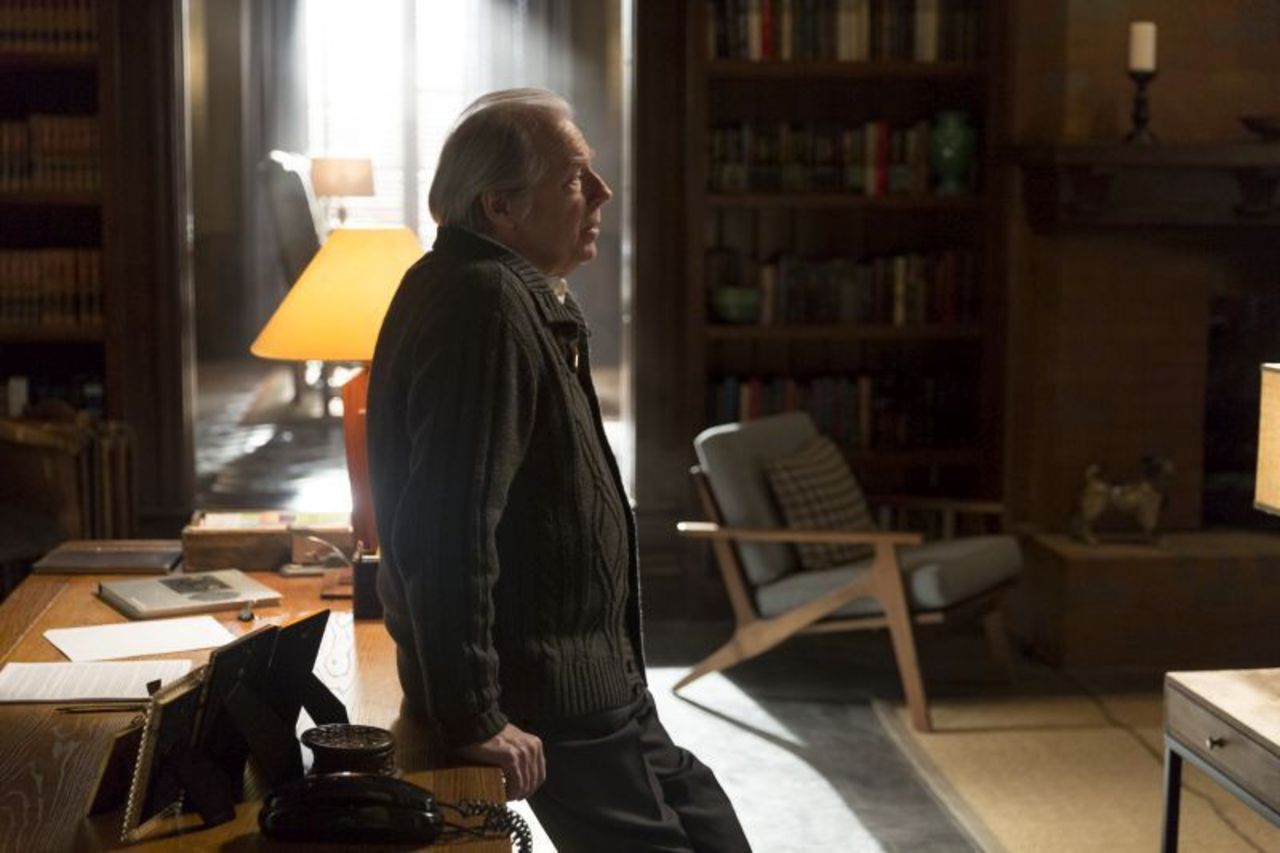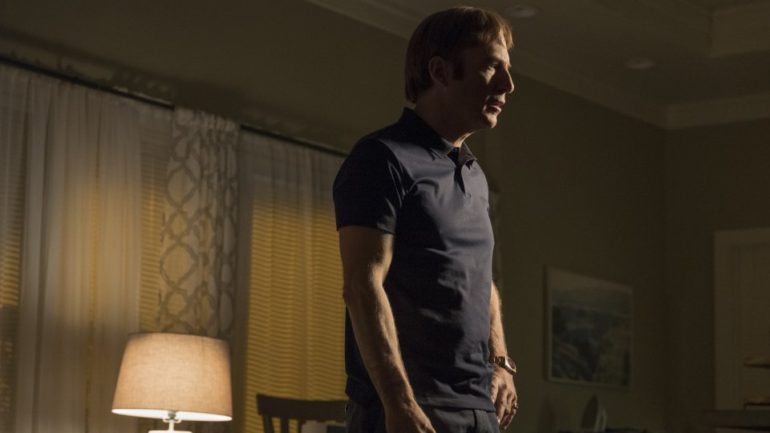Margaux and I bid farewell to an excellent season of Better Call Saul.
Trevor: Better Call Saul is such a strange beast. You and I have talked before about how the show is almost tailor-made for binge watching, and so often the show’s greatness sneaks up on you (season three I think is an exception; with the show entering endgame it’s not afraid to flex its muscle a little bit). Compare that approach to, say, Breaking Bad, to use the obvious comparison, which insists on itself more often (I don’t mean that as a knock against BB) – you can watch an episode like “Dead Freight” or “Ozymandius” and know instantly, holy shit, that was a great episode of television. Which brings me to “Lantern” – holy shit, that was a great episode of television.
Margaux: It’s hard for me distill succinctly what it is that I loved so much about “Lantern”; not only was it a damn-near perfect hour of television, it was also an extremely satisfying finale, which is hard to pull off. All of this is to say, you don’t get finales like “Lantern” by accident, but by working hard to get these characters to stick to your audience – and I’m not exclusively referring to the ones we’re more familiar with. Also, I’m an unrepentant Gennifer Hutchison stan and if you ever needed a reason to become fan of hers, this episode is a great example.
From the cold open to the final moments, I really wanted to barf from anxiety in the best way.
Trevor: There’s your DVD blurb! What I love about BCS finales is the sense of causality and inevitability they always exemplify; it shows us that this is a real world with real consequences. Kim gets six hours of sleep in one week; she crashes her car. Hector becomes far too public; he loses the transportation gig. Chuck tries a power play; Howard calls his bluff.
Can we start at that opening scene? I loved the way director Peter Gould framed it, with Chuck and Howard seated at opposite ends of the conference table, looking like duelists. And the ending was perfectly in character, both for Chuck (who constantly underestimates people) and Howard (who is never afraid of being a dick). The check was enough of an insult – Howard’s favorite insult; what does it say that Jimmy refused his money, Kim paid it back, but Chuck took it? – but making Chuck do the walk of shame to rapturous applause was a great twist of the knife, the message being clear: Look at all these people. McGill is just a name on the sign. They’ll be here, and so will I, long after you’re gone, so take the money you wanted so badly and get the fuck out of here.
Margaux: The scene between Howard and Chuck is probably the most upset we’ve ever seen Howard (he doesn’t get mad often, as per your above mentions), but that’s how deeply Chuck hurt him. And Chuck’s grave miscalculation in how HHM would react led Howard to want to be rid of Chuck so badly, he was just gonna pay him out of his own pocket (and damn, Howard has a lot of Fuck You money). For once, Howard didn’t have the air about him that he thought he was the best dressed man in the room, he sincerely looked pained by this exchange, and like any acrimonious breakup, looked even more relieved to clap his ass right out of the building. Ugh, even more reason to think HHM equals douchebags, they operate not dis-similarly to Apple.
It was an interesting cut to go from the cold open flashback of Jimmy and Chuck reading The Adventures of Mabel by lantern light, to the adversarial conference room of Chuck’s ultimate firing.
Trevor: This season has really played with light, which makes it even more inevitable that everything comes to a head in an episode titled “Lantern,” in which the titular object plays a vital role. This show is so goddamn smart.
Margaux: I could also argue that the title nearly gives away what happens at the end, but we can get to that.
Trevor: So, speaking of smooth segues, I love and hate what a bully Hector is. This is probably the most Mark Margolis has spoken all season, and he really does his best to make Hector as loathsome as possible. You want this entitled, demanding prick to end up in a wheelchair, but at what cost? Nacho will absolutely be collateral damage, which means there was surprisingly little catharsis in the scene where Hector collapses (again, not a knock). The look that Gus gives Nacho is very telling, in my opinion. Gus is unflappable and pragmatic, so my season four prediction is that he finds out what Nacho did and gives him up to Don Eladio, in order to secure his position in the cartel.
Margaux: Interesting you say that because I agree with you up until the part where Gus gives up Nacho to Don Eladio. Lest we forget, Gus fucking haaaaaaaaaates Hector, and now with transportation all funneling through Los Pollos, why wouldn’t Gus be happy to have Hector out of the way? Beyond Hector being an easily despicable person, he’s really bad at being a criminal. He’s so high key. My guess would be that the heart attack doesn’t take out Hector, and when Gus tries to poach Nacho (or something, Better Call Saul knows what they’re doing), that’s when Nacho becomes collateral damage and more motivation for Gus to put Hector in the chair.
Trevor: That’s very true, Gus hates Hector’s guts. You’re most likely right, but if Hector is an invalid he’s no real threat anyway, so Gus could have his chicken and eat it too. But I don’t want to spend too much time theorizing (that’s what Fargo reviews are for).
Another thing I liked a lot about “Lantern” is that it felt like a genuine continuation of “Fall,” which we both agreed was Jimmy at his absolute worst. Here he tries to atone, and after having no luck with Chuck (“You never really mattered that much to me”), he does a great job with Irene Landry. He torpedoes his practice and loses all his clients, just to get an old woman her friends back. There’s hope for Jimmy yet, which is going to make it even harder to watch him complete the transformation to Saul Goodman.
Margaux: As we’ve talked about before, Kim is Jimmy’s moral compass; when she’s around less, it shows. Plus, Jimmy likes to be needed and he enjoys being a caretaker, just look at what he put with and did for Chuck. So after Kim’s accident, not only does he pull off the side of the road to the crash site to recoup her lost paperwork, he recognizes what role he played in Kim’s near-death experience and finally lets their office space go. Now, I don’t want to veer too far into theories, but it feels very in-line with where the character ends up and where he is the timeline we’re watching, in order for Saul to emerge, Gimme Jimmy has to die. And at least he threw himself into the fire for a good cause because Jimmy can definitely change hearts and minds of a lot of people, but not those old broads from Sandpiper.
Trevor: I feel like it’s the last gasp of James McGill, Decent Man. Especially after what happens to Chuck – he’s going to blame himself for that, no doubt. Which we’ll get to. First I’d like to talk about the last extended montage of the season, that of Chuck dismantling his entire house. It’s riveting, anxiety-inducing, and just plain sad. To me it’s reminiscent of the end of The Conversation, where Gene Hackman tears apart his apartment searching for a recording device (Dave Porter’s frenetic jazz score really underlines the connection).
Margaux: I referred to the montage less eloquently in my notes: “Chuck Stranger Things’ his walls,” except that doesn’t do it justice. It was hard to watch, what we later to know to be, the beginning of the end. Chuck so quickly undoes all the progress he’s made, and the further he retreats, the sadder and harder it is to watch. I knew Howard forcing him out, his “great legal mind” losing another battle, would break him. Is it the conversation between he and Jimmy what pushed him over the edge or did Chuck no longer think getting better was no longer worth it after being ousted at HHM?
Trevor: It’s tough to say. For the last three seasons we’ve watched Chuck lose every relationship that was important to him: Jimmy, Rebecca, HHM, even Ernesto. Still, that didn’t make the end any easier to watch. The rhythmic thump of Chuck’s foot against the table as he tried to knock over the lamp reminded me of Hitchcock’s definition of suspense: two people sit at a table and a bomb explodes, that’s surprise; if you know the bomb is there, that’s suspense. Better Call Saul has been showing us this bomb since the pilot episode.
Margaux: Do you think Chuck meant it when he told Jimmy, “you never mattered all that much to me”? Personally, I believe it was the most honest Chuck has ever been. He turned around sued the law firm he started, he tried get his own brother disbarred (well, that’s a touch more complicated). Why shouldn’t we have been lead to believe that Chuck only views other people as a means to an end that’ll benefit him?
Trevor: I agree with you, and I think that’s what makes the comment so ironic in retrospect, because Chuck has always painted Jimmy as a remorseless user of people. This shows they have way more in common than either would probably want to admit.
Now, as much as I am loath to do so, the time has come to say goodbye to “Lantern” and to season three of Better Call Saul. Shall we talk stars? You know the drill, episode first, then season. Unless there’s something else you want to touch on!
Margaux: I’m happy to see Jimmy and Kim’s relationship in better place, we’ll see how long that lasts because the difference between Kim and Jimmy is, Kim can learn from her mistakes (she finally took time off to sleep and watch To Kill A Mockingbird). Jimmy, on the other hand, has to play to his strengthens, and we all know what those are.
Alright, I guess if you don’t want to write another 1,000 words on “Lantern”, we can wrap it up. Season three was strong for Better Call Saul, I’m hard pressed to find many (if any) things I didn’t like it, especially episode-to-episode. Even though I called for Chuck’s head many times since season one of the show, you always hoped he (and Jimmy’s relationship) would be redeemed, but they expertly sucked all the life out of the character till he died.
“Lantern” score: 5/5
Better Call Saul season 3 score: 4.5/5



